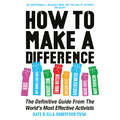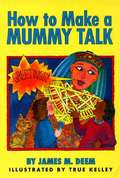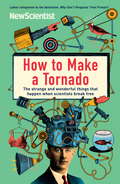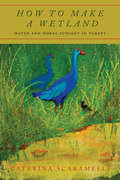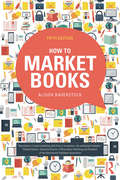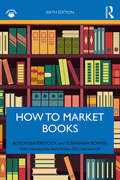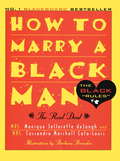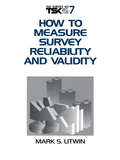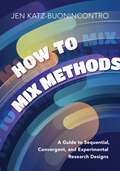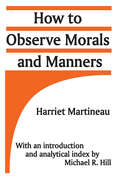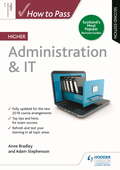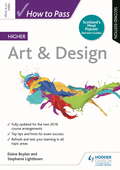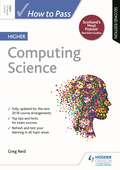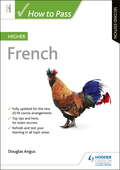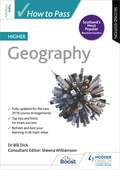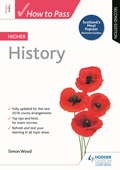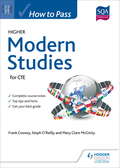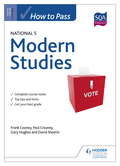- Table View
- List View
How to Make a Difference: The Definitive Guide from the World's Most Effective Activists
by Kate Robertson Ella Robertson"An exceptionally relevant book for this age of activism." Bob GeldofWith a foreword by Kofi Annan, former Secretary-General of the UN (1997-2006).How to Make a Difference is a practical roadmap to modern day activism created by the powerful and imaginative minds behind the world's biggest campaigns including Colin Kaepernick, Emma Watson, Sir Bob Geldof, Fatima Bhutto, Black Lives Matter, Doutzen Kroes, Yeonmi Park, Terry Crews, Cher, Matt Damon, Paul Polman and Gina Miller; collectively they combine the latest models of thinking, their real life experiences, radical techniques and effective advice in order to help incentivize everyone and anyone who has ever wondered, how can I help? From How to Change the Law, How to Protest, How to Use Social Media Effectively, How to End a Problem Forever and How to Change a Big Organization, this book educates as much as it encourages and informs us all to see the world as something that can and must be changed. This book will help you find an active role in positive, necessary activism and meaningful change on every scale across the globe. The only book to pool together the biggest names in activism and showcase how they have used their voices, their networks and their abilities to change the world around us.How to Make a Difference speaks to a generation who are switching selfie-sticks for protest placards and will showcase how everyone has the ability to be the change they want to see in the world.If not now, when? If not you, who?Perfect for fans of This Is Not a Drill, No One Is Too Small to Make a Difference and There Is No Planet B.(p) 2019 Octopus Publishing Group
How to Make a Mummy Talk
by James M. DeemIn this funny, fact-filled book, author James M. Deem takes readers on a mummy-discovery tour that spans centuries and continents. He explains exactly what mummies are, how they are created, where they have been found, how scientists investigate them, and what they tell us about the people who lived long ago.
How to Make a Tornado: The strange and wonderful things that happen when scientists break free
by New ScientistScience tells us grand things about the universe: how fast light travels, and why stones fall to earth. But scientific endeavour goes far beyond these obvious foundations. There are some fields we don't often hear about because they are so specialised, or turn out to be dead ends. Yet researchers have given hallucinogenic drugs to blind people (seriously), tried to weigh the soul as it departs the body and planned to blast a new Panama Canal with atomic weapons.Real scientific breakthroughs sometimes come out of the most surprising and unpromising work. How to Make a Tornado is about the margins of science - not the research down tried-and-tested routes, but some of its zanier and more brilliant by-ways. Investigating everything from what it's like to die, to exploding trousers and recycled urine, this book is a reminder that science is intensely creative and often very amusing - and when their minds run free, scientists can fire the imagination like nobody else.
How to Make a Tornado: The strange and wonderful things that happen when scientists break free
by New ScientistScience tells us grand things about the universe: how fast light travels, and why stones fall to earth. But scientific endeavour goes far beyond these obvious foundations. There are some fields we don't often hear about because they are so specialised, or turn out to be dead ends. Yet researchers have given hallucinogenic drugs to blind people (seriously), tried to weigh the soul as it departs the body and planned to blast a new Panama Canal with atomic weapons.Real scientific breakthroughs sometimes come out of the most surprising and unpromising work. How to Make a Tornado is about the margins of science - not the research down tried-and-tested routes, but some of its zanier and more brilliant by-ways. Investigating everything from what it's like to die, to exploding trousers and recycled urine, this book is a reminder that science is intensely creative and often very amusing - and when their minds run free, scientists can fire the imagination like nobody else.
How to Make a Wetland: Water and Moral Ecology in Turkey
by Caterina ScaramelliHow to Make A Wetland tells the story of two Turkish coastal areas, both shaped by ecological change and political uncertainty. On the Black Sea coast and the shores of the Aegean, farmers, scientists, fishermen, and families grapple with livelihoods in transition, as their environment is bound up in national and international conservation projects. Bridges and drainage canals, apartment buildings and highways—as well as the birds, water buffalo, and various animals of the regions—all inform a moral ecology in the making. Drawing on six years of fieldwork in wetlands and deltas, Caterina Scaramelli offers an anthropological understanding of sweeping environmental and infrastructural change, and the moral claims made on livability and materiality in Turkey, and beyond. Beginning from a moral ecological position, she takes into account the notion that politics is not simply projected onto animals, plants, soil, water, sediments, rocks, and other non-human beings and materials. Rather, people make politics through them. With this book, she highlights the aspirations, moral relations, and care practices in constant play in contestations and alliances over environmental change.
How to Market Books
by Alison Baverstock'Baverstock is to book marketing what Gray is to anatomy; the undisputed champion.' Richard Charkin, Executive Director of Bloomsbury Publishing and President Elect of the International Publishers Association Over four editions, Alison Baverstock’s How to Market Books has established itself as the industry standard text on marketing for the publishing industry, and the go-to reference guide for professionals and students alike. With the publishing world changing like never before, and the marketing and selling of content venturing into uncharted technological territory, this much needed new edition seeks to highlight the role of the marketer in this rapidly changing landscape. The new edition is thoroughly updated and offers a radical reworking and reorganisation of the previous edition, suffusing the book with references to online/digital marketing. The book maintains the accessible and supportive style of previous editions but also now offers: a number of new case studies detailed coverage of individual market segments checklists and summaries of key points several new chapters a foreword by Michael J Baker, Professor Emeritus of Marketing, Strathclyde University.
How to Market Books
by Alison Baverstock Susannah BowenOver five editions, How to Market Books has established itself as the standard text on marketing for both the publishing industry and the wider creative economy. Industry professionals and students of Publishing Studies rely on the techniques and tactics in this invaluable book. With the publishing industry changing fast, and the marketing and selling of content now delivered worldwide through technology, this much needed guide highlights the critical role of the marketeer, and the strategies and techniques at their disposal. The book’s approach is logical and calming; beginning with marketing theory and moving into how this works in practice. Readers benefit from a blend of practical advice on how to organise and deliver marketing plans – and an objectivity which supports their future management of issues not yet on the horizon. Thoroughly updated, this 6th edition maintains the book’s popular, accessible and supportive style, and now offers: A fully international perspective for today’s global industry New case studies to illustrate changing industry issues and application Completely updated coverage of digital and social marketing and GDPR Topical updates, more case studies and tips on getting work in publishing on a companion website Detailed coverage of individual market segments, bringing relevance to every area of publishing
How to Marry a Black Man
by Cassandra Cato-Louis Monique Jellerette DejonghTen of Monique and Cassandra's twenty-five tips...1. Get your act togetha, so when you finally do meet Mr. Right, he can't resist you.2. Smile and say "hello" to every Black man you see.3. Forgive old lovers and make peace with them.4. Tell everyone you know that you're looking for a husband.5. Go on as may blind dates as possible.6. Date men who are not your "type"--you may be pleasantly surprised.7. If you ask a man a series of questions within the first five minutes of meeting him, he'll tell you almost anything you want to know. After that he clams up and won't tell you a thing.8. If you realize right away he is someone you don't like but does have an interesting job or hobby, he may have a friend who's perfect for you.9. If he's available and you like him, don't hesitate to let him know.10. Dress conservatively. If you attract him with your body, how are you going to keep him with your mind?About six years ago, on the eve of her thirtieth birthday, Monique Jellerette was desperate to get married, but couldn't seem to find the right man. A married friend, Cassandra, offered some solid (albeit unsolicited) advice. Monique, determined to do it her own way, suffered through a few more dates from Hell before she realized Cassandra's tips might make sense. So she started putting Cassandra's suggestions to work, made up a few tricks of her own, and devised a plan of action...Six months later Monique met and married Bob and became Mrs. Monique Jellerette deJongh! Now, in How to Marry a Black Man, Mrs. Monique Jellerette deJongh and Mrs. Cassandra Marshall Cato-Louis share their secrets with women everywhere.Based on Monique and Cassandra's proven techniques, and coupled with the results of all-male focus groups on what Black men are really looking for in a prospective mate, How to Marry a Black Man is part manual/journal and part workbook, and delivers the goods on how to master the dating game and find a husband.
How to Measure Survey Reliability and Validity
by Mark S. LitwinImproving the accuracy of a survey is the focus of Mark S. Litwin's book, which shows how to assess and interpret the quality of survey data by thoroughly examining the survey instrument used. He explains how to code and pilot test new and established surveys. In addition, he covers issues such as: how to measure reliability (including test-retest, alternate form, internal consistency, inter-observer and intra-observer reliability); how to measure validity (including content, criterion and construct validity); how to address cross-cultural issues in survey research; and how to scale and score a survey.
How to Mix Methods: A Guide to Sequential, Convergent, and Experimental Research Designs
by Jen Katz-BuonincontroThis book shows researchers in education, psychology, health, and other social sciences how to mix qualitative and quantitative research methods together with confidence. How can researchers sequence and incorporate data in ways that are meaningful, without simply combining data and hoping it makes sense? This book walks readers through the essential steps to avoid some common mistakes and to clarify confusing parts of common method designs. It offers a series of "how-to" steps, situated within the core mixed methods designs. Students and researchers will learn the 10 essential design elements of all mixed methods research, how to clearly distinguish between the different core mixed methods designs, how to figure out which design works best for their research, and more.
How to Observe Morals and Manners
by Harriet MartineauHow to Observe Morals and Manners is the first systematic and substantive treatise on the methodology of sociological research. First published in 1838 and long out of print, this new edition presents for modern students research techniques used by those whose work has been the foundation for present-day social science. The book is based upon two years of intensive field research in the United States, and is a pioneering benchmark for all subsequent methodology texts in sociology. Martineau charts a comprehensive guide to sociological observation, exploring problems of bias, hasty generalization, samples, reactivity, interviews, participant observation, corroboration, and data recording techniques. Couching her observations as advice to travellers visiting foreign lands, she warns against preconceptions and urges strict reporting of observed patterns of cross-sections of social life. She also illustrates how to use interview data to corroborate observational data. Pragmatic tips and specific questions are suggested for exploring the major institutions of society, including religion, education, marriage, popular culture, markets, prisons, police, media, government, fine arts, and charities. Intended as a treatise on methodology, the book is also an insightful work of theory. Before Marx, and well before Durkheim and Weber, Martineau examined social class, forms of religion, types of suicide, national character, domestic relations and the status of women, delinquency and criminology, and the intricate interrelationships between social institutions and the individual. The book will be of interest to sociologists, geographers, anthropologists, historians, and researchers in women's studies. The introduction by Michael R. Hill locates the book within Martineau's overall epistemology of social analysis, revealing her to be a reflexive, critical, and scientific pioneer of sociological thought.
How to Pass Higher Administration & IT, Second Edition (How To Pass - Higher Level)
by Adam Stephenson Anne BradleyExam Board: SQA Level: Higher Subject: Administration & IT First Teaching: August 2018 First Exam: May 2019Get your best grade with comprehensive course notes and advice from Scotland's top experts, fully updated for the latest changes to SQA Higher assessment. How to Pass Higher Administration & IT Second Edition contains all the advice and support you need to revise successfully for your Higher exam. It combines an overview of the course syllabus with advice from top experts on how to improve exam performance, so you have the best chance of success.- Revise confidently with up-to-date guidance tailored to the latest SQA assessment changes - Refresh your knowledge with comprehensive, tailored subject notes- Prepare for the exam with top tips and hints on revision techniques- Get your best grade with advice on how to gain those vital extra marks
How to Pass Higher Administration & IT: Second Edition Epub
by Adam Stephenson Anne BradleyExam Board: SQA Level: Higher Subject: Administration & IT First Teaching: August 2018 First Exam: May 2019Get your best grade with comprehensive course notes and advice from Scotland's top experts, fully updated for the latest changes to SQA Higher assessment. How to Pass Higher Administration & IT Second Edition contains all the advice and support you need to revise successfully for your Higher exam. It combines an overview of the course syllabus with advice from top experts on how to improve exam performance, so you have the best chance of success.- Revise confidently with up-to-date guidance tailored to the latest SQA assessment changes - Refresh your knowledge with comprehensive, tailored subject notes- Prepare for the exam with top tips and hints on revision techniques- Get your best grade with advice on how to gain those vital extra marks
How to Pass Higher Art & Design, Second Edition (How To Pass - Higher Level)
by Elaine Boylan Stephanie LightbownExam Board: SQA Level: Higher Subject: Art & Design First Teaching: August 2018 First Exam: May 2019Get your best grade with comprehensive course notes and advice from Scotland's top experts, fully updated for the latest changes to SQA Higher assessment. How to Pass Higher Art & Design Second Edition contains all the advice and support you need to revise successfully for your Higher exam. It combines an overview of the course syllabus with advice from top experts on how to improve exam performance, so you have the best chance of success.- Revise confidently with up-to-date guidance tailored to the latest SQA assessment changes - Refresh your knowledge with comprehensive, tailored subject notes- Prepare for the exam with top tips and hints on revision techniques- Get your best grade with advice on how to gain those vital extra marks
How to Pass Higher Art & Design: Second Edition Epub
by Elaine Boylan Stephanie LightbownExam Board: SQA Level: Higher Subject: Art & Design First Teaching: August 2018 First Exam: May 2019Get your best grade with comprehensive course notes and advice from Scotland's top experts, fully updated for the latest changes to SQA Higher assessment. How to Pass Higher Art & Design Second Edition contains all the advice and support you need to revise successfully for your Higher exam. It combines an overview of the course syllabus with advice from top experts on how to improve exam performance, so you have the best chance of success.- Revise confidently with up-to-date guidance tailored to the latest SQA assessment changes - Refresh your knowledge with comprehensive, tailored subject notes- Prepare for the exam with top tips and hints on revision techniques- Get your best grade with advice on how to gain those vital extra marks
How to Pass Higher Computing Science, Second Edition (How To Pass - Higher Level)
by Greg ReidExam Board: SQA Level: Higher Subject: Computing Science First Teaching: August 2018 First Exam: May 2019 Get your best grade with comprehensive course notes and advice from Scotland's top experts, fully updated for the latest changes to SQA Higher assessment. How to Pass Higher Computing Science Second Edition contains all the advice and support you need to revise successfully for your Higher exam. It combines an overview of the course syllabus with advice from a top expert on how to improve exam performance, so you have the best chance of success.- Revise confidently with up-to-date guidance tailored to the latest SQA assessment changes - Refresh your knowledge with comprehensive, tailored subject notes- Prepare for the exam with top tips and hints on revision techniques- Get your best grade with advice on how to gain those vital extra marks
How to Pass Higher Computing Science: Second Edition Epub (How To Pass - Higher Level Ser.)
by Greg ReidExam Board: SQA Level: Higher Subject: Computing Science First Teaching: August 2018 First Exam: May 2019 Get your best grade with comprehensive course notes and advice from Scotland's top experts, fully updated for the latest changes to SQA Higher assessment. How to Pass Higher Computing Science Second Edition contains all the advice and support you need to revise successfully for your Higher exam. It combines an overview of the course syllabus with advice from a top expert on how to improve exam performance, so you have the best chance of success.- Revise confidently with up-to-date guidance tailored to the latest SQA assessment changes - Refresh your knowledge with comprehensive, tailored subject notes- Prepare for the exam with top tips and hints on revision techniques- Get your best grade with advice on how to gain those vital extra marks
How to Pass Higher French, Second Edition (How To Pass - Higher Level)
by Douglas AngusExam Board: SQA Level: Higher Subject: French First Teaching: August 2018 First Exam: May 2019Get your best grade with comprehensive course notes and advice from Scotland's top experts, fully updated for the latest changes to SQA Higher assessment. How to Pass Higher French Second Edition contains all the advice and support you need to revise successfully for your Higher exam. It combines an overview of the course syllabus with advice from a top expert on how to improve exam performance, so you have the best chance of success.- Revise confidently with up-to-date guidance tailored to the latest SQA assessment changes - Refresh your knowledge with comprehensive, tailored subject notes- Prepare for the exam with top tips and hints on revision techniques- Get your best grade with advice on how to gain those vital extra marks
How to Pass Higher French: Second Edition Epub
by Douglas AngusExam Board: SQA Level: Higher Subject: French First Teaching: August 2018 First Exam: May 2019Get your best grade with comprehensive course notes and advice from Scotland's top experts, fully updated for the latest changes to SQA Higher assessment. How to Pass Higher French Second Edition contains all the advice and support you need to revise successfully for your Higher exam. It combines an overview of the course syllabus with advice from a top expert on how to improve exam performance, so you have the best chance of success.- Revise confidently with up-to-date guidance tailored to the latest SQA assessment changes - Refresh your knowledge with comprehensive, tailored subject notes- Prepare for the exam with top tips and hints on revision techniques- Get your best grade with advice on how to gain those vital extra marks
How to Pass Higher Geography, Second Edition (How To Pass - Higher Level)
by Bill Dick Sheena WilliamsonExam Board: SQA Level: Higher Subject: Geography First Teaching: August 2018 First Exam: May 2019Get your best grade with comprehensive course notes and advice from Scotland's top experts, fully updated for the latest changes to SQA Higher assessment. How to Pass Higher Geography Second Edition contains all the advice and support you need to revise successfully for your Higher exam. It combines an overview of the course syllabus with advice from top experts on how to improve exam performance, so you have the best chance of success.- Revise confidently with up-to-date guidance tailored to the latest SQA assessment changes - Refresh your knowledge with comprehensive, tailored subject notes- Prepare for the exam with top tips and hints on revision techniques- Get your best grade with advice on how to gain those vital extra marks
How to Pass Higher Geography, Second Edition (How To Pass - Higher Level)
by Bill Dick Sheena WilliamsonExam Board: SQA Level: Higher Subject: Geography First Teaching: August 2018 First Exam: May 2019Get your best grade with comprehensive course notes and advice from Scotland's top experts, fully updated for the latest changes to SQA Higher assessment. How to Pass Higher Geography Second Edition contains all the advice and support you need to revise successfully for your Higher exam. It combines an overview of the course syllabus with advice from top experts on how to improve exam performance, so you have the best chance of success.- Revise confidently with up-to-date guidance tailored to the latest SQA assessment changes - Refresh your knowledge with comprehensive, tailored subject notes- Prepare for the exam with top tips and hints on revision techniques- Get your best grade with advice on how to gain those vital extra marks
How to Pass Higher History, Second Edition (How To Pass - Higher Level)
by Simon WoodExam Board: SQA Level: Higher Subject: HistoryGet your best grade with comprehensive course notes and advice from Scotland's top experts.This revision guide contains all the advice and support that you need to revise successfully for your Higher History exam. It combines an overview of the course syllabus with advice from top experts on how to improve exam performance, so you have the best chance of success.> Refresh your knowledge with comprehensive, tailored subject notes> Prepare for the exam with top tips and hints on revision techniques> Get your best grade with advice on how to gain those vital extra marks
How to Pass Higher History: Second Edition Epub
by Simon WoodExam Board: SQA Level: Higher Subject: History First Teaching: August 2018 First Exam: May 2019Get your best grade with comprehensive course notes and advice from Scotland's top experts, fully updated for the latest changes to SQA Higher assessment.How to Pass Higher History Second Edition contains all the advice and support you need to revise successfully for your Higher exam. It combines an overview of the course syllabus with advice from top experts on how to improve exam performance, so you have the best chance of success.- Revise confidently with up-to-date guidance tailored to the latest SQA assessment changes - Refresh your knowledge with comprehensive, tailored subject notes- Prepare for the exam with top tips and hints on revision techniques- Get your best grade with advice on how to gain those vital extra marks
How to Pass Higher Modern Studies for CfE
by Frank Cooney Steph O'Reilly Mary Clare McgintyGet your best grade with this guide to Higher Modern Studies for CfEThis book contains all the advice and support you need to revise successfully for your Higher exam (for CfE). It combines an overview of the course syllabus with advice from a top expert on how to improve exam performance, so you have the best chance of success.- Refresh your knowledge with complete course notes- Prepare for the exam with top tips and hints on revision techniques- Get your best grade with advice on how to gain those vital extra marks
How to Pass National 5 Modern Studies
by Frank Cooney Paul CreaneyGet your best grade with the SQA endorsed guide to National 5 Modern Studies.This book contains all the advice and support you need to revise successfully for your National 5 exam. It combines an overview of the course syllabus with advice from a top expert on how to improve exam performance, so you have the best chance of success. Refresh your knowledge with complete course notes Prepare for the exam with top tips and hints on revision technique Get your best grade with advice on how to gain those vital extra marks
